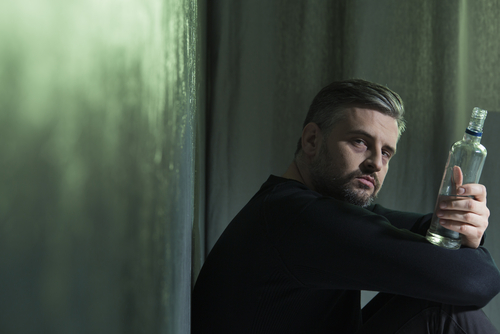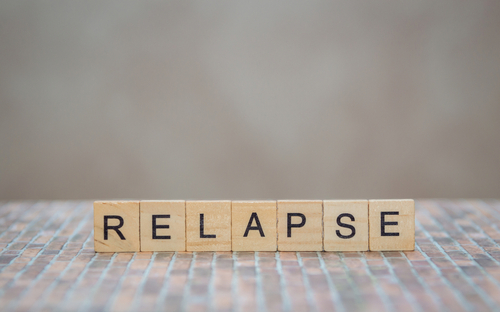If you, a loved one, or someone you know is a recovering addict, chances are relapse is on your mind and something you want to avoid. If you’re unfamiliar with relapse or unsure of how it happens, this article will help.
What Is Relapse?
Relapse is when someone abstaining from alcohol or drugs takes them again after a short or long period of recovery and sobriety. A lapse is a temporary “slip” where someone may use but quickly return to being sober, whereas a relapse is a more extended return to substance abuse. People who have been addicted to drugs or alcohol for a while have a higher risk of relapse due to long-term use.

Stages Of Relapse For A Recovering Addict
There are two types of relapse: traditional and freelapse.
- A traditional relapse is when a recovering addict consciously decides to drink or use drugs. This can be to reduce stress after being sober or use with friends, believing they can control the amount.
- A “freelapse” is an accidental relapse resulting from drinking or drug use without realizing it. For example, a person might mistakenly drink alcohol at a party, thinking it’s non-alcoholic. This can also occur if someone deceives a recovering alcoholic into drinking alcohol or places drugs in their drink without consent.
Sometimes, the traditional relapse process can start long before someone with an substance use disorder consumes alcohol or drugs. Cravings and desires can be triggered by particular ideas, feelings, and events, and if these aren’t addressed, the chance of relapse can increase. This process is split into three stages.
- Emotional relapse: At the beginning of the relapse process, a person may start to deal with negative emotions in unhealthy ways. Instead of addressing their issues, they suppress their emotions, distance themselves from their social circles, deny their problems, and ignore self-care. Although they may not be actively considering substance use at this point, how they manage their emotions can make them more susceptible to drug use in the future.
- Mental relapse: In the mental relapse stage, individuals are aware of the conflicting feelings inside them about sobriety. While a part of them desires to stay sober, other parts are struggling with cravings and secretly planning to relapse. This stage can also involve romanticizing their past substance abuse, downplaying the risks of drug use, and voluntarily placing themselves in high-risk situations.
- Physical relapse: The last stage of relapse is when a recovering addict actually drinks alcohol or takes drugs. What starts as one drink or joint can become a full-fledged relapse, where they feel like they can’t stop.

What Causes Relapse?
- Exposure to triggers. Triggers that activate a craving for substances can be either social or environmental. Social triggers include running into an active drinker or user, while environmental triggers are objects, smells, or locations linked to substance use.
- Stress. High-stress levels and poor coping skills can lead to turning to substances for relief. Negative emotions, such as anger, anxiety, depression, and boredom can increase your risk for relapse.
- Interpersonal problems. Arguments between family members and friends can result in destructive emotions, such as anger, sadness, and frustration. Studies show that 50% of all relapses are due to interpersonal conflicts.
- Peer pressure. Family members or friends who suffer from substance abuse or drug addictions may encourage you to use too. Even being in the presence of people using drugs or alcohol can create intense cravings to drink or use, increasing your risk of relapse.
- Lack of social support. When someone has a support system that is either limited or unhelpful, it can be challenging to manage difficult emotions or practice self-care without resorting to drugs or alcohol as a coping mechanism.
- Pain from injuries, accidents, chronic disease, or other health conditions can cause pain, and many medical practitioners will prescribe narcotics. However, some people may use these substances illegally to manage short-term or long-term pain. Although it can be safe to use these medications under the guidance of the prescriber, those with a background of addiction may struggle to regulate their intake due to the strong addictive characteristics of opioids.
- Low self-efficacy. Self-efficacy is confidence in your ability to succeed in your recovery journey. Research shows people who have less confidence in staying sober have a greater likelihood of relapse. However, those who have a feeling of authority over their sobriety have a better chance of preventing relapse.
- Positive moods. Positive emotions can also lead to a return to substance abuse. When a recovering addict feels enthusiastic, they can be tempted to enhance the experience by taking drugs or alcohol. Special events like anniversaries and birthdays traditionally connected with alcohol or recreational drugs can also increase the risk of a relapse.
How Relapse Can Affect A Recovering Addict’s Mental Health
Someone trying to stay away from drug or alcohol use can struggle with anguish and regret if they relapse. They can feel hopeless and continue to use substances to deal with the guilt. Many therapists and recovering addicts believe the journey to overcoming substance addiction is long, and relapse (or repeated relapses) is to be expected during addiction recovery. They believe relapse during the recovery process is an opportunity for self-improvement, learning more about risk factors, withdrawal symptoms, and warning signs of relapse so that they can progress toward long-term sobriety.

What’s The Recovery Process For Relapse?
Initially, someone dealing with relapse must decide if they should go back to rehab. If the relapse was an isolated incident, and they are devoted to revising their recovery plan, they may not have to enter an inpatient facility.
On the other hand, if a recovering addict returns to a cycle of substance abuse or they’re spending time with people who encourage drug use and drink to deal with mental health issues, it’s suggested they should return to a treatment center. Once they’re in a new treatment program, it’s important to incorporate psychological treatment, such as cognitive behavioral therapy (CBT). If a recovering addict attends an outpatient treatment center, professionals will help them find outside support groups, such as alcoholics anonymous, sober companions, or sober living.
How Can Addiction Treatment Help With Relapse Prevention?
With a structured treatment plan, therapy, and a positive support network, you can manage triggers and cravings, preventing relapse. Paying attention to your triggers and learning healthy coping strategies can bolster your faith in staying sober and even get involved in recovery support for others.
How MD Home Detox Can Help With Addiction Relapse
If you or someone you know is a recovering addict struggling with relapse, contact MD Home Detox. We offer 100% safe, at-home medical detox plans so that you can work through recovery without the anxiety and pain withdrawal symptoms can cause. Once you’ve detoxed enough to safely participate in other activities, we’ll create you a personalized relapse prevention plan and help you find support groups, therapists, and other resources to guide you through your recovery journey.

